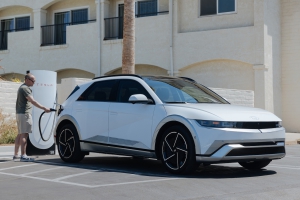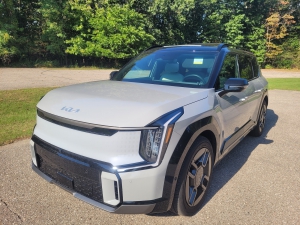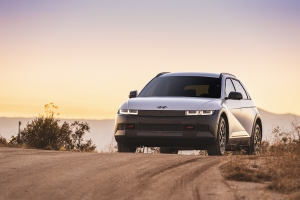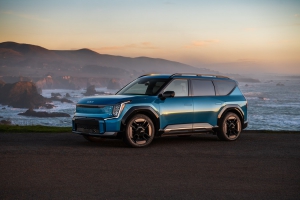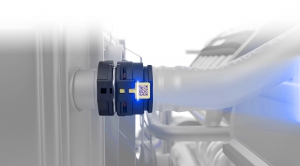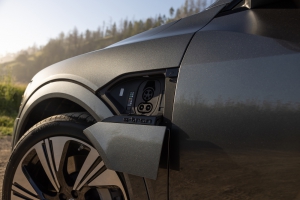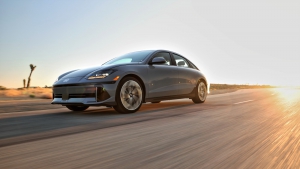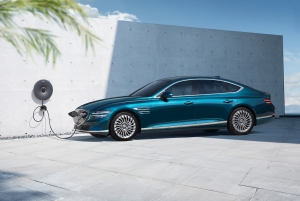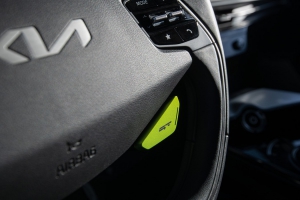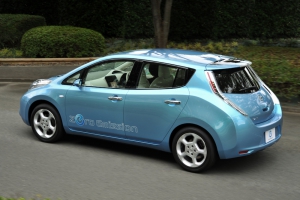Hyundai Ioniq 5: 5 Things to Know
While there are some people still skeptical of embracing the electric vehicle movement, there are plenty of folks who want to have one in their driveway, and a solid list of available EVs to help them achieve that goal.
Hyundai is among the companies that has embraced the electric movement, offering a strong lineup of EVs — including the excellent Ioniq 5 compact SUV, which I was recently able to spend some time with.
Read on to learn 5 things that you need to know about the Ioniq 5 to determine if it’s the right EV for you, as it battles other electric vehicles such as the Ford Mustang Mach-E, Volkswagen ID.4, Tesla Model Y, and Kia EV6.
1. Strong EV range, fast charging
Range on the Ioniq 5 will span from 245 miles (on base model) up to 318 miles (on RWD models in SE/SEL/Limited trims). AWD options land between 259 miles and 290 miles. The Ioniq 5’s numbers are competitive, as they are among the best you’ll find in this size of EV, limiting any range anxiety.
One reality check: Keep in mind that if you live in colder weather climates, cold temperatures can impact the actual distance and limit mileage of any EV you purchase.
Charging at home overnight with a Level 2 charger is the best option for any EV, but if you must charge publicly for any reason, the Ioniq 5 is compatible with the fast 350 kW public chargers that can get you from 10 percent to 80 percent in about 20 minutes, and is also compatible with Tesla superchargers.
With range, power and style, 2026 Kia EV9 sets a high bar for electric 3-row SUVs
In the EV landscape, one area with a limited number of offerings to date is the three-row SUV. You have a few choices, but it’s not the smorgasbord of options you get with smaller EVs.
One brand not afraid to compete in this large EV category is Kia, which offers the Kia EV9, a three-row SUV that aims to deliver power, roominess and versatility, strong range and charging, and sharp design.
I recently tested a 2026 Kia EV9 GT-Line model, and can safely say that Kia has succeeded on all counts — arguably offering the best option in the category.
Competitors exist that each have their own strengths (including Hyundai Ioniq 9, Rivian R1S and Volvo EX90), but as an overall package it’s hard to top the EV9.
Read on for my full review of this fun and family-focused offering from Kia, which is now in its third year of production, and features new updates for 2026 such as compatibility with Tesla chargers.
2025 Hyundai Ioniq 5 is a stylish, powerful electric SUV
While the much-anticipated transition to electric vehicles has its ups and downs in recent years at some car makes, other brands are ignoring all the drama and sticking to their plans or even accelerating their transition.
Once such brand is Hyundai, which offers several EV models including the Ioniq 5 — a compact electric SUV that I recently had the opportunity to experience.
The Ioniq 5 hits a nice sweet spot in the EV landscape, offering a smaller size, solid mileage range, a roomy interior and strong tech features.
New for 2025 is the XRT trim level, an off-road friendly model, as well as extended range numbers, plus updates to its charging capabilities and interior.
Read on to find out how this vehicle, which is made at Hyundai’s plant in Georgia, compares in the segment to rivals such as the Ford Mustang Mach-E and Volkswagen ID.4, Tesla Model Y, and Kia EV6.
Three-row Kia EV9 is the best electric vehicle of 2024
As the move toward electrification continues, it takes a lot to stand out amid the constant stream of new vehicle announcements.
One way to distinguish yourself is to do things a little bigger, like Kia has done with its impressive 2024 Kia EV9 three-row SUV, which debuts as one of the few options for EV buyers seeking a larger vehicle to fit bigger families and more cargo.
A bit larger than Kia’s highly popular Telluride SUV, the EV9 offers stunning design inside and out, excellent range, and an overall package that make it a leader in an EV category with only a handful of options from brands like Rivian, Tesla and Mercedes-Benz.
Kia is making a bold commitment by entering this larger EV segment, while other brands are still hesitant to jump into the EV realm with larger offerings. (Note: Kia also has multiple other EVs of various sizes scheduled to come out in the next two years as well)
I recently spent some time behind the wheel of an 2024 Kia EV9 GT-Line model, and I’m back with a full report on what is clearly the best EV I’ve tested so far in 2024.
ARaymond: Fluid interfaces and fastening solutions are improving EV thermal management
By Sébastien Frasse-Sombet
Senior Global Product Manager, ARaymond
As the automotive industry continues to evolve and electric vehicles (EVs) become more mainstream, innovations are affecting all vehicle components, including the fasteners and assembly systems used.
One such system is thermal management, a critical element of an EV, with dozens of connection points in each vehicle. The EV and its battery pack must be adequately cooled to ensure safe and efficient operation. It’s essential to secure all fluid lines to avoid leakage inside a battery pack or near the vehicle’s electric components.
Autonomous driving functions are expected to increase this requirement. During autonomous driving, a vehicle’s ADAS computer is cooled by the same liquid that cools the battery. Loss of function can damage the calculator from overheating, potentially leading to an accident. As a result, OEMs are increasing demands for secure connections and product traceability.
In addition to helping automakers ensure EVs are as safe as possible, advances in fastener solutions for thermal management are also making the process of building EVs more ergonomic — allowing suppliers to tailor and customize parts for each requirement. The result is a better and safer electric vehicle for drivers.
Safety first
A key element of thermal management fluid interfaces is a reliable locking mechanism. This comes in many forms. Some quick connectors, when inserted, can provide visual, tactile, and audible confirmation — so an installer feels and hears when the connection is made.
Other options include the use of QR (quick-response) or DMC (datamatrix) codes, allowing for better traceability. QR codes are two-dimensional matrix barcodes invented in the mid-90s. They were initially created to track automotive parts during the assembly process and became widely used in consumer products in the 2000s.
DMC is also two-dimensional but square and can store a significant amount of information. For this reason, it’s becoming the preferred method of encoding data.
In either case, this data is available for review in the event of any concerns or maintenance issues with the vehicles. Such verification is critical for safety and traceability reasons, making identifying possible root causes of potential problems easier. Secured fasteners for thermal management systems and fluid line connections keep EV drivers and passengers safer, an essential goal for all automakers.
Better health
Advanced connection systems for EVs also mean improvements for the technicians building and installing these fastening solutions. This is because many connectors used on EVs have become low-push quick connectors — which means less insertion effort is required during installation.
This is important as it saves plant workers potential repetitive strain or musculoskeletal injuries from accessing the installation point continually throughout their shift.
Typically, these installation points can be challenging to access, increasing the chance of a faulty connection, which can lead to vehicle component damage or poor reliability. There’s also a significant number of connectors required in every EV.
Additionally, larger fluid lines are used, so a proper connection requires more force. When done manually, ergonomics are a concern. By simplifying the architecture of fastener installation, OEMs provide a safer workplace for employees assembling EVs while improving vehicle reliability.
Versatile designs
Automakers have specific requirements and specifications for their electric vehicle lineup. Special features and custom component designs have become essential. One such feature is lightweighting, especially for EVs where vehicle weight and range are significant.
Many custom designs are compressed in size so they fit into tight spaces. The trend toward smaller connectors allows for better space optimization and reduced weight. Part materials can be plastic or metal to serve the connection point best, whether for the battery pack or to seal in individual battery cells.
Suppliers can work with OEMs to offer environmentally friendly materials, eco-friendly designs, and a full lifecycle analysis of the parts. This allows suppliers to play an important role in helping OEMs reach their CSR goals. Custom designs further allow connections to be built for ease of assembly and serviceability, as well as with sustainability in mind. An improved sustainability model minimizes the OEM’s footprint while maximizing coolant flow.
While EVs are presenting new fastening challenges due to a focus on thermal management, the industry is rising to the challenge with products that improve vehicle safety, address ergonomic issues at the assembly level, and create customized solutions that will benefit the automakers and the environment.
Sébastien Frasse-Sombet is a Senior Global Product Manager for global automotive supplier ARaymond.
2024 Audi Q8 e-tron EV delivers classy design, powerful drive
Electric vehicles continue to generate news, specifically regarding how ready the public are to adopt them en masse.
But in the luxury realm of vehicles, many automakers are fully committed to making EVs a priority, and Audi is one that fits that category — planning to make all new vehicle offerings electric by 2026, and completely electrify its vehicle lineup by 2033.
At the moment, they have several EV options for sale, and I recently spent some time behind the wheel of their flagship EV — the 2024 Audi Q8 Sportback e-tron.
Improved for 2024 with a more powerful battery and longer range, improved aerodynamics, as well as some styling updates, the Q8 e-tron aims to be one of the main options for people looking to join the ranks of luxury EV ownership.
Read on for a full breakdown of what it has to offer and how well it competes in the overall EV landscape vs. rivals from BMW, Genesis, Jaguar and more.
Hyundai Ioniq 6 offers impressive range and power; capable of taking the fight to Tesla
It’s an interesting time for the world of electric vehicles.
Story after story talks about how the EV revolution is falling short and demand isn’t living up to expectations.
But don’t tell that to Hyundai, who are rising to become perhaps the biggest star in the EV field behind Tesla, which had a bit of a head start on the legacy automakers.
The Ioniq 6 is one of Hyundai’s stronger EV offerings, and is the sedan version of their Ioniq 5 crossover. Its most direct competitor is the Tesla Model 3, but it is also high-end enough to take on upscale vehicles like the BMW i4 and the Polestar 2.
I recently spent some time behind the wheel of an Ioniq 6, and I’m back with a full report on how it measures up in today’s EV landscape.
Genesis Electrified G80 sedan sets high standard for luxury EVs
The Genesis brand, which has made major moves in the luxury car world for the past half-decade or so, is making a heavy move toward EVs.
They see the future is electric, and already offer multiple EV options, both on the SUV and sedan side of the business.
When it comes to the Genesis sedan lineup, the vehicle that began this transition is the midsize G80 sedan. Genesis first launched an Electrified G80 variant for the 2023 model, which carries over to 2024. What’s interesting about this particular model is there isn’t some radical new design offered, instead they are keeping the standard G80’s looks essentially intact, and swapping in electric power.
Read on for a breakdown of how well the Electrified G80 holds up in the growing luxury EV market.
Kia EV6 GT is a standout rocket of an EV
The road to an EV-focused lineup is going more smoothly for some automakers than others, and one of those having a strong performance as of late are the Hyundai-Kia family of EVs.
Both brands are seeing strong demand for their recent EV offerings, and I recently spent some time behind the wheel of one of the most impressive options, the Kia EV6 GT. (Note: I tested a 2023 model of the EV6, but the 2024 model sees no major changes)
After the EV6’s initial debut in 2022, it was time to ramp up the power for 2023 and beyond, and that’s what the GT model does, unleashing a massive 576 horsepower to deliver massive acceleration and a driving experience you won’t be able to equal in most cars on the road — EV or otherwise.
Competing most directly in the EV space against Ford’s Mustang Mach-E and the Tesla Model Y (as well as its in-house rival, the Hyundai Ioniq 5), the EV6 GT is a force to be reckoned with. Read on to learn more about how it stands up against the EV competition.
Nissan EV named as one of world’s great transport innovations of the last 90 years
The world's first mass-market electric vehicle has secured its place among some of the world's greatest transport innovations, according to a survey conducted by Nissan to mark its 90th birthday this week.
Since the company was founded, on 26th December 1933, Nissan has established a storied history of pioneering electric vehicles, legendary performance cars and revolutionary crossovers that demonstrate its own daring spirit of innovation over the last nine decades.
From the 1947 Tama electric vehicle, via the LEAF – the world's first mass-market EV in 2010 – to recently revealed future EV concepts like the Hyper Punk and Hyper Urban, the company strives to enrich people's lives with thrilling journeys and pioneering technology that help to create a cleaner, safer and more inclusive world.
News Categories
Popular Tags
Search Reviews by Make

AutoTechReviews is your home for In-depth reviews of the latest cars, trucks, and SUVs; information on all the emerging vehicle technology; and breaking news from the world of NASCAR and other motorsports.
